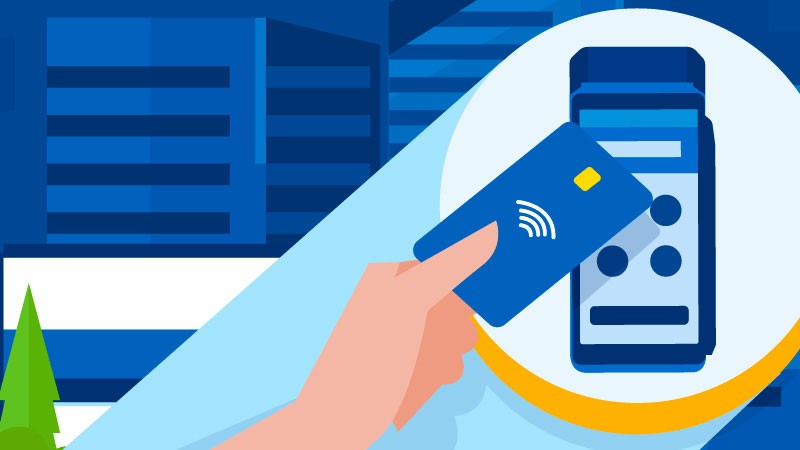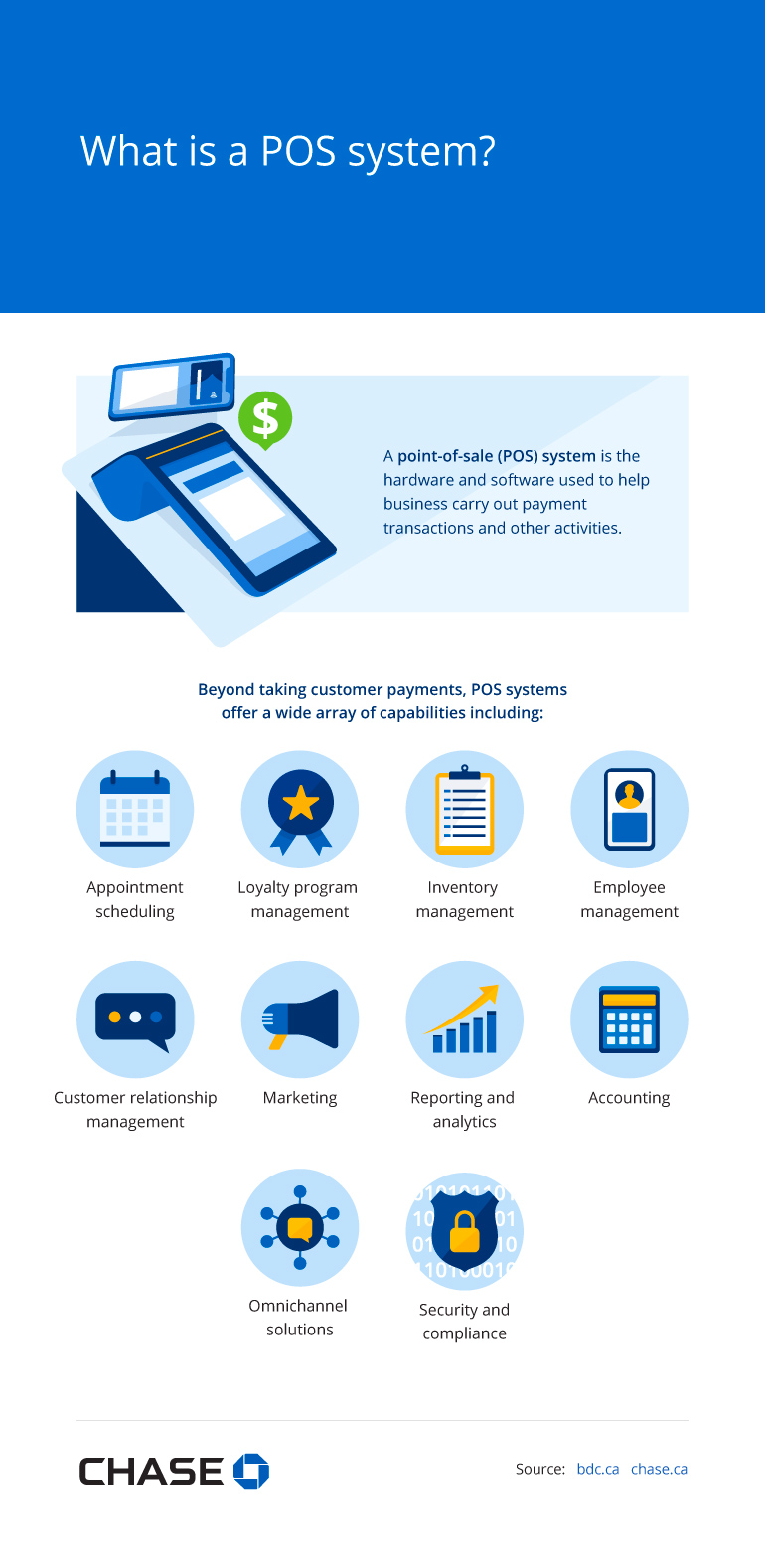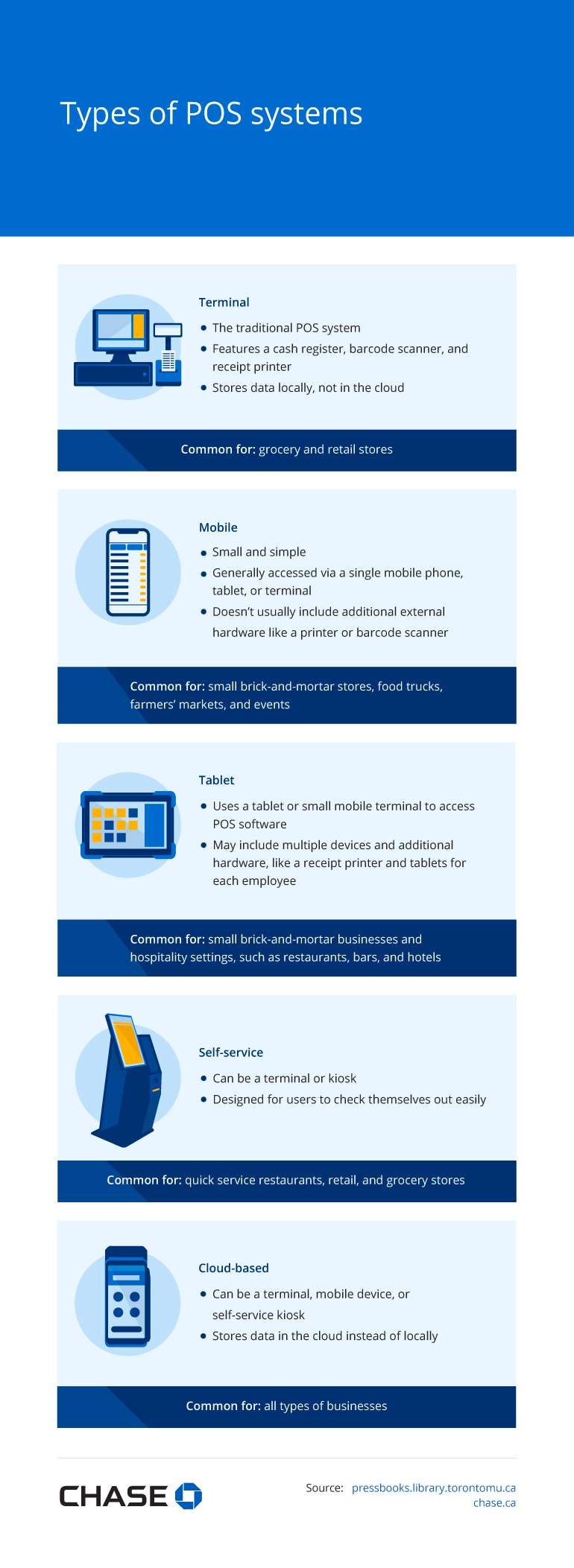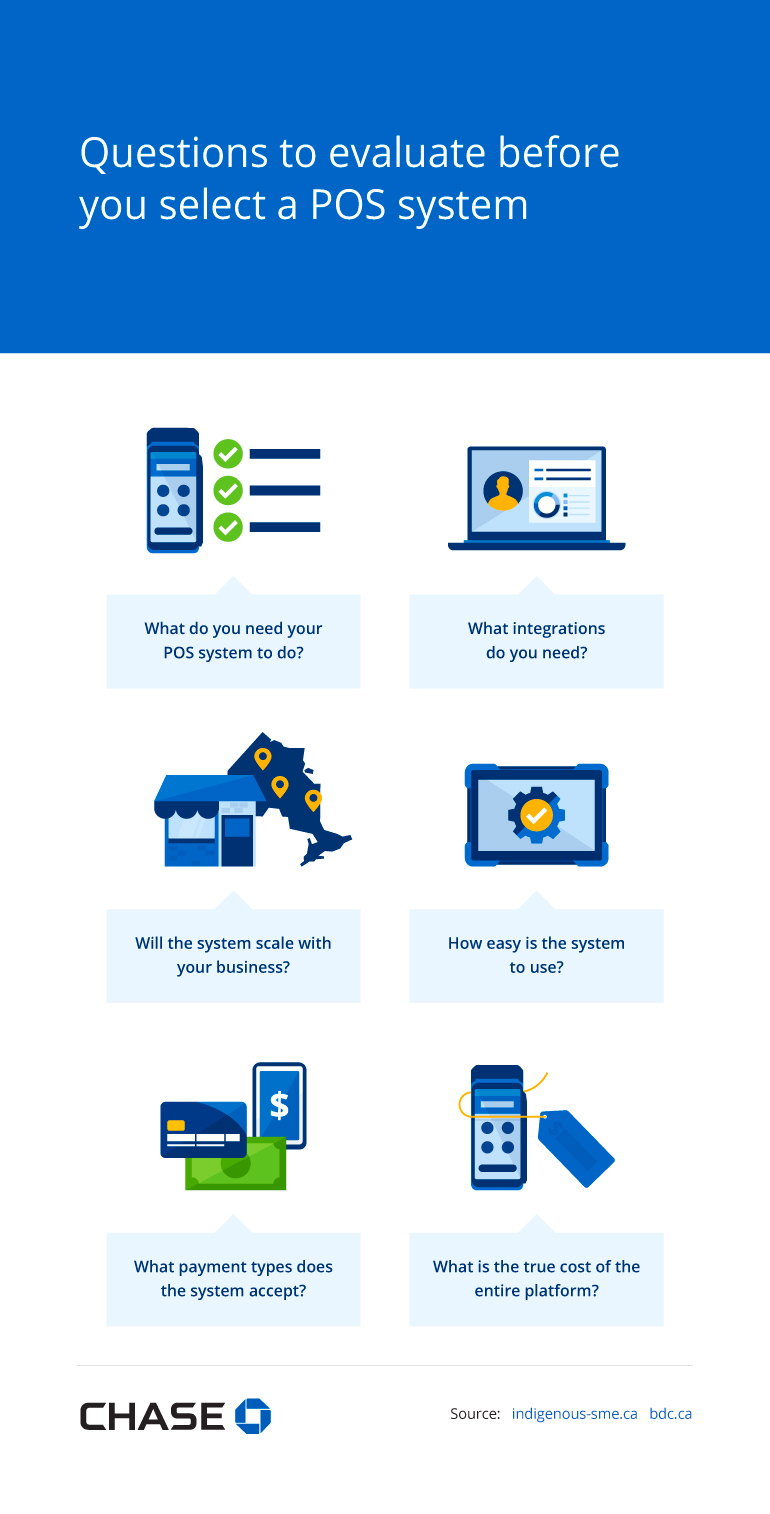How to choose the right POS system for your business
By Danielle Antosz

A point-of-sale (POS) system is the backbone of business operations. It’s how businesses accept and process payments, complete sales, and manage customer transactions. Every year, Canadian businesses process more than $11 trillion in payments, many of which flow through POS systems. Chase alone processes more than $2 trillion in annual debit and credit volume worldwide.
Choosing the right POS system can significantly impact operational efficiency, customer satisfaction, and overall profitability. Whether you run a retail store, restaurant, food truck, small boutique, or other business of any size, understanding the different types of POS systems and the features they offer is crucial to your success.

A point-of-sale (POS) system is the hardware and software used to help businesses carry out payment transactions and other activities.
Beyond taking customer payments, POS systems offer a wide array of capabilities including:
- Appointment scheduling
- Loyalty program management
- Inventory management
- Employee management
- Customer relationship management
- Marketing
- Reporting and analytics
- Accounting
- Omnichannel solutions
- Security and compliance
Sources:
Types of POS systems
The first step in selecting the right type of POS system is to consider your specific business needs. For example, does your business need a single terminal, or do you have multiple employees checking customers out simultaneously? Do you want data stored locally or in the cloud? Each type of POS system offers different features and storage methods to consider.
- Terminal
This traditional POS system features a cash register, barcode scanner, and receipt printer. The main difference between terminal POS systems and other systems is that they store data locally, not in the cloud. These systems are standard in places such as grocery and retail stores. - Mobile
This small, simple POS system is generally accessed via a single mobile phone, tablet, or terminal. These systems typically don't include additional external hardware like a printer or barcode scanner. Mobile POS systems are popular in small brick-and-mortar stores, food trucks, farmers’ markets, and events. - Tablet
This system uses a tablet to access POS software. It may include multiple devices and additional hardware, like a receipt printer and tablets for each employee. Tablet POS systems are a popular option for small brick-and-mortar businesses and hospitality settings, such as restaurants, bars, and hotels. - Self-service
This option is designed for users to check themselves out easily. Self-service POS systems are commonly kiosks used in retail and grocery stores. - Cloud-based
A cloud-based POS system stores data in the cloud (a network of remote servers on the Internet) instead of locally. It can be a terminal, mobile device, tablet, or self-service kiosk. You can find cloud-based POS systems in all types of businesses, from retail to hospitality.

Terminal
- The traditional POS system
- Features a cash register, barcode scanner, and receipt printer
- Stores data locally, not in the cloud
- Common for: grocery and retail stores
Mobile
- Small and simple
- Generally accessed via a single mobile phone, tablet, or terminal
- Doesn’t usually include additional external hardware like a printer or barcode scanner
- Common for: small brick-and-mortar stores, food trucks, farmers’ markets, and events
Tablet
- Uses a tablet or small mobile terminal to access POS software
- May include multiple devices and additional hardware, like a receipt printer and tablets for each employee
- Common for: small brick-and-mortar businesses and hospitality settings, such as restaurants, bars, and hotels
Self-service
- Can be a terminal or kiosk
- Designed for users to check themselves out easily
- Common for: quick service restaurants, retail, and grocery stores
Cloud-based
- Can be a terminal, mobile device, tablet, or self-service kiosk
- Stores data in the cloud instead of locally
- Common for: all types of businesses
Sources:
How to evaluate a POS system
When evaluating a POS system, you'll want to consider ease of use, scalability, and other factors particular to your business. Ask yourself the following questions to ensure the POS system you choose meets the needs of both you and your customers:
- What do you need your POS system to do?
All POS systems process sales, but many offer additional features. For instance, do you need inventory management, the ability to assign tables in a restaurant, or to manage reward programs? - What integrations do you need?
Automation and data sharing can help you make better business decisions. Do you want your POS system to integrate with email marketing tools, accounting software, CRM systems, and more? Does the system you're considering work with the tools you use every day? - Will the system scale with your business?
Does the system work for your business today, and will it work when you have a larger inventory, open additional locations, or need more features? Most importantly, will you need to invest in a completely new hardware package as you scale, or can you simply buy additional hardware as needed? - How easy is the system to use?
Will customers or employees use the platform? How much training will be required? Is the platform intuitive to use, or does it offer support and training for employees? - What payment types does the system accept?
Does it offer tap to pay, bank transfers, gift cards, and other payment methods your customers prefer? - What is the true cost of the entire platform?
What hardware, software, payment processing, setup, rental, and maintenance costs will you be responsible for? Which costs are recurring?

- What do you need your POS system to do?
- What integrations do you need?
- Will the system scale with your business?
- How easy is the system to use?
- What payment types does the system accept?
- What is the true cost of the entire platform?
Sources:
POS system features to consider
Modern POS systems offer a dizzying array of features, additions, and benefits. Keep the following factors in mind when you begin the search for the right POS system for you.
Sales reporting and analytics
Most cloud-based POS systems offer sales reporting and analytics, such as daily sales, inventory, sales by employee, and profitability reports — just to name a few. Consider if the POS system you're evaluating offers the reports you need to track your business's financials.
Inventory management
If your business sells physical items, you may want to consider a POS system that offers inventory management so you can keep tabs on the average turnaround time of your inventory, plan materials ordering, and more.
Mobile capabilities
If your business is in a large physical space or one that moves often, in the case of a farmers’ market booth, make sure the POS system offers mobile capabilities. A mobile device that allows employees to check customers out anywhere can increase sales and improve the customer experience.
Employee management
Some POS systems support employee management features, such as scheduling and clocking in and out. If you currently use an external tool for employee management, combining it with your POS system can save money and improve operational efficacy.
Loyalty program management
Loyalty programs can increase customer loyalty and improve retention. If you currently offer a loyalty program or are considering implementing one, make sure your POS system supports these features.
Integrations
Today's business world is more data-focused than ever. Integrations can connect your CRM to your email list, allow data to flow from your POS system to your accounting software, and much more. Integrations are especially important in e-commerce and retail, where ease of integration is a top factor for choosing a payment processing vendor, according to the 2024 State of Canadian Payments. Make sure the system you select connects with the other tools and platforms you already use.
Industry-specific features
Modern POS systems do more than just scan barcodes and add sales tax. They can also manage employee schedules, sync with your accounting software, and allow you to take payments on the go. Beyond some of the more ubiquitous features you’ll find in your search, make sure to take industry-specific features into account , too. For example, a restaurant POS system might include table management, tip management, and bill splitting.
Ability to scale
When selecting a POS system, keep in mind that some systems scale easily, while others may require you to switch as you grow. For example, if you own a food truck but plan to open a restaurant, look for a POS system that allows you to add a kitchen printer and mobile devices to take orders down the road.
With the right POS, it’s all systems go
Choosing a powerful POS system can positively impact profitability, operational efficacy, and customer satisfaction. Learn more about POS systems and how to grow your business with our educational resources.